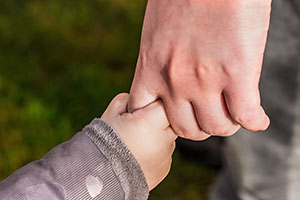When to Report Child Abuse to CPS (and How to Do It)
March 31, 2017April is Child Abuse Prevention Month: are you prepared to recognize and appropriately report an abusive or neglectful situation?

Being able to recognize child abuse or neglect is the first step toward stopping it. Some cases are more obvious than others, but understanding the law is critical to knowing when legal intervention is necessary and how best to contact the authorities.
Recognizing Abuse or Neglect
Child abuse and neglect are not limited to noticeable physical harm or abandonment, so make sure the full scope of both definitions are taken into account. Remember, “reasonable suspicion” is the only requirement for calling Child Protective Services (CPS).
Here are seven offenses a parent, guardian or caretaker can commit that would be considered abuse or neglect of a child, as per the Code of Virginia, section 63.2-100:
- Causes or threatens to cause a nonaccidental physical or mental injury.
- Has a child present during the manufacture or attempted manufacture of a controlled substance or during the unlawful sale of such substance where such activity would constitute a felony violation.
- Commits or allows to be committed any illegal sexual act upon a child, including incest, rape, indecent exposure, and prostitution, or allows a child to be used in any sexually explicit visual material.
- Neglects or refuses to provide adequate food, clothing, shelter, emotional nurturing, or health care.
- Abandons the child.
- Neglects or refuses to provide adequate supervision in relation to a child’s age and level of development.
- Knowingly leaves a child alone in the same dwelling with a person, not related by blood or marriage, who has been convicted of an offense against a minor for which registration is required as a violent sexual offender.
Exact definitions vary from state-to-state, but the above guidelines constitute an informative starting point. For a comprehensive list of indicators in both parent/guardian/caretaker and child behavior, review “A Guide For Mandated Reporters In Recognizing And Reporting Child Abuse And Neglect.”
Report Criteria
Naturally, if signs of the aforementioned offenses are present for a child, the average person may feel an obligation to report the abuse or neglect and should do so within the definition of reasonable suspicion. However, in the State of California, for example, an individual is legally mandated to report reasonable suspicion of abuse or neglect of a child if any of the following job titles apply: “Health practitioner, child visitation monitors, fire fighter, animal control officer, humane society officer, district attorney, school employees, film processors, clergy, social workers, daycare workers, police department employees, administrators or employees of public or private youth organizations or day camps.” Failure to report abuse or neglect of a child if you hold one of the above positions could result in a fine or even jail time.
Once the decision to report potential child abuse or neglect has been made, ensure that your statement is grounded by the following five criteria that allow CPS to register an official, actionable report:
- Identity and Location
Before CPS can take action, the identities of the abused and the abuser(s), as well as their locations, must be confirmed. Full names, phone numbers, and home or business addresses (or just the city and state) will be invaluable information. - Age of the Child
From a legal perspective, the age of the abused party is extremely important. If the abused is under 18, always make the call to report. However, if the abused person is over the age of 18 or not under professional care due to long-term health concerns, such as physical or mental impairment (even then, states often cap the application of “child” at 21), then child abuse or neglect is not likely to apply in a legal sense. Of course, cases of assault should still be reported to your local police. - Jurisdiction
Where did the alleged abuse take place and where are the parties involved now? Not only is this information vital for location, it also establishes guidelines of legal responsibility for the investigation, if this is deemed appropriate. - Persons Legally Responsible
Who perpetrated the abuse or neglect? Any adult who was responsible for the child’s care or wellbeing during the relevant timeframe of the suspected abuse or neglect can be investigated. This includes any adult who regularly spent time in the child’s home. - Allegation of Abuse or Neglect
If the report claims a child is being abused: Is the alleged abuse physical, sexual or emotional? Did the abuser(s) carry out the alleged abused directly or by creating a situation where the abuse/danger was imminent?
If the report claims a child is being neglected: Is the child in immediate danger? Has the legally responsible adult allowed a dangerous environment to flourish actively or inactively? Has the child been harmed by the neglectful situation?
Once the above questions can be answered as thoroughly as possible, an official report can be made and acted upon quickly to help the child. - When and Who to Call
Keep in mind, “you do not need to be certain that child abuse or neglect has occurred before you call the Child Abuse Hotline.” Reasonable suspicion and the information listed above is enough for the CPS to register a report.
To lodge a report call the Childhelp National Child Abuse Hotline at 1-800-4-A-CHILD (1-800-422-4453). You can also find your specific state organization’s contact information here.